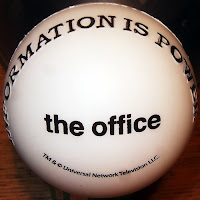
The phrase information is power has long been used to explain political manoeuvres in public life and in businesses. Generations have striven to acquire knowledge and thereby rise up the food chain.
I would suggest that with the advent of Google and more recently mobile devices like the iPhone, information and therefore knowledge on virtually any subject is available to anyone, anyplace anytime.
So if knowledge is no longer the factor that differentiates us then what is?
The answer as I see it, is time, or more precisely our lack of it. It shouldn't be that way because most of us subscribe to more supposedly time saving devices than our parents ever did. Yet we work longer hours, commute further and proudly claim to be "sooo busy"
Strangely this must mean that the very busy are at a distinct disadvantage. When do they find the time and energy to think creatively, research new opportunities and tap into the infinite knowledge library that is just a click away?
More importantly is our busyness and connectedness fooling us into believing we are establishing and maintaining deep and meaningful relationships when really we are just developing relationships a mile wide and an inch deep.
What if the thing that keeps us busy stopped? Would our lives still have meaning?
Each minute of each day we are free to choose how we use our time, its more valuable than ever, let's not waste it.
I would suggest that with the advent of Google and more recently mobile devices like the iPhone, information and therefore knowledge on virtually any subject is available to anyone, anyplace anytime.
So if knowledge is no longer the factor that differentiates us then what is?
The answer as I see it, is time, or more precisely our lack of it. It shouldn't be that way because most of us subscribe to more supposedly time saving devices than our parents ever did. Yet we work longer hours, commute further and proudly claim to be "sooo busy"
Strangely this must mean that the very busy are at a distinct disadvantage. When do they find the time and energy to think creatively, research new opportunities and tap into the infinite knowledge library that is just a click away?
More importantly is our busyness and connectedness fooling us into believing we are establishing and maintaining deep and meaningful relationships when really we are just developing relationships a mile wide and an inch deep.
What if the thing that keeps us busy stopped? Would our lives still have meaning?
Each minute of each day we are free to choose how we use our time, its more valuable than ever, let's not waste it.
